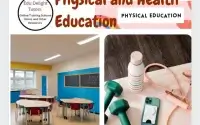Examination Questions Security Education JSS 1 Second Term Weekly Topics
Security Education JSS 1 Second Term – Week 13 Examination
Examination Instructions for Teachers and Students
For Teachers:
- Ensure all students are seated properly before the exam begins.
- No student should bring textbooks, notes, or any other materials into the exam hall.
- Read out the instructions clearly before distributing the question papers.
- Move around the class to monitor students and prevent cheating.
- Any student caught engaging in examination malpractice should be reported immediately.
- Collect all answer sheets at the end of the exam and ensure no student leaves with a question paper.
For Students:
- Read all questions carefully before answering.
- Do not talk to your classmates during the exam.
- Cheating, copying, or using unauthorized materials is not allowed.
- Keep your eyes on your own paper.
- If you have a question, raise your hand and wait for the teacher to assist you.
- Ensure your handwriting is clear and neat.
- Submit your answer sheet before leaving the exam hall.
Part A: Objective Questions (Multiple Choice – 30 Questions)
-
______ is taking something that does not belong to you.
a) Giving
b) Stealing
c) Helping
d) Sharing -
Falsehood theft is when someone ______.
a) Lies to take what is not theirs
b) Buys something expensive
c) Sells food items
d) Writes an exam -
Examination malpractice is ______.
a) Preparing for exams
b) Cheating in exams
c) Attending extra classes
d) Studying hard -
______ is an example of a crime.
a) Honesty
b) Stealing
c) Hard work
d) Kindness -
Cultism mostly happens in ______.
a) Schools
b) Supermarkets
c) Churches
d) Homes -
Drug abuse means ______.
a) Taking medicine wrongly
b) Visiting the doctor
c) Drinking enough water
d) Eating healthy food -
______ is a type of fraud that tricks people into sending money.
a) Hard work
b) Honesty
c) 419 (Advance Fee Fraud)
d) Kindness -
A person who steals money from their workplace commits ______.
a) Embezzlement
b) Charity
c) Respect
d) Studying -
The act of forcing someone into sexual activity is called ______.
a) Friendship
b) Rape
c) Playing
d) Talking -
Fake drugs can cause ______.
a) Healing
b) Sickness
c) Joy
d) Good health
(Continue up to 30 questions following the same pattern.)
Part B: Theory Questions (Short Answer – 30 Questions)
- What is examination malpractice?
- List two causes of stealing.
- What is falsehood theft?
- Give two dangers of drug abuse.
- What is cultism?
- Why do people cheat in exams?
- What is bribery?
- Name two security agents in Nigeria.
- What is 419 (Advance Fee Fraud)?
- How can we prevent examination malpractice?
- What happens when someone sells fake drugs?
- Mention two dangers of cultism.
- What is thuggery?
- Give two reasons why people join gangs.
- What is the effect of selling contaminated food?
- Who are security agents?
- What is corruption?
- Mention two ways to report a crime.
- What is the full meaning of NAFDAC?
- Why do people commit embezzlement?
- How does bribery affect society?
- What is the role of the police?
- What happens when someone lies to steal money?
- Name two examples of financial fraud.
- What is the meaning of fake drugs?
- How can students avoid examination malpractice?
- What happens when people sell banned food?
- Name one effect of gang violence.
- What should you do if you see a crime happening?
- What is the effect of rape on a victim?
Part C: True or False Questions (30 Questions)
- Falsehood theft is when someone takes what is not theirs by lying. (True)
- Drug abuse makes people healthier. (False)
- Cultism is good for schools. (False)
- Stealing is a crime. (True)
- Security agents help to keep the country safe. (True)
- Examination malpractice is a good way to pass exams. (False)
- Selling fake drugs can lead to death. (True)
- Bribery makes society fair. (False)
- 419 is a type of fraud. (True)
- People join cults for protection. (True)
- Fake drugs are safe for sick people. (False)
- Security agents are responsible for enforcing the law. (True)
- Corruption helps a country grow. (False)
- Bribery is a form of corruption. (True)
- Thuggery means using violence to get what you want. (True)
- Stealing is a way of earning honest money. (False)
- Cultism helps students perform better in school. (False)
- Fake drugs can make someone sicker. (True)
- Cheating in exams is a good habit. (False)
- Embezzlement is when people steal from their office or workplace. (True)
(Continue up to 30 questions following the same pattern.)
Part D: Fill in the Gaps Questions (30 Questions)
- ______ is when someone takes what is not theirs.
- ______ is a crime where people cheat in exams.
- Selling fake drugs can cause ______.
- People join ______ to feel powerful.
- Examination malpractice leads to ______.
- ______ are people who help to enforce the law.
- Fake drugs can make people ______ instead of better.
- ______ means using force to harm others.
- Cultism mostly happens in ______.
- Bribery is a form of ______.
- ______ is when someone takes money from their workplace.
- 419 is also known as ______.
- Drug abuse means using drugs the ______ way.
- ______ is the act of forcing someone into sexual activity.
- Selling contaminated food can make people ______.
- ______ is a type of fraud where people trick others for money.
- The police are an example of ______.
- ______ is the act of taking things that do not belong to you.
- Thuggery is when people use ______ to get what they want.
- Gangs often engage in ______ activities.
- Examination malpractice can lead to ______.
- The full meaning of NAFDAC is ______.
- ______ is the illegal act of cheating in an exam.
- A person who forces others into illegal activities is called a ______.
- Fake drugs can cause ______ instead of healing.
- People should report crimes to ______.
- Corruption makes society ______.
- ______ is when someone steals money from their office.
- People should avoid ______ to pass exams.
- ______ helps keep people safe from criminals.
Conclusion
The teacher will supervise the examination, ensure students follow the rules, and mark their scripts afterward.
Related
Related posts:
- Causes and Effects of Gangs – JSS 1 Security Education Lesson Note
- Causes and Effects of Thuggery – JSS 1 Security Education Lesson Note
- Causes and Effects of Fake Drugs – JSS 1 Security Education Lesson Note
- Causes and Effects of Selling Banned and Contaminated Food – JSS 1 Lesson
- Causes of Falsehood and Theft – JSS 1 Security Education Lesson Note
Related Posts

Ọ̀rọ̀ Ọ̀rùkọ àti Ọ̀rọ̀ Àròpò Ọ̀rùkọ Nínú Èdè Yorùbá – Itumọ̀, Iṣẹ́, Àpẹẹrẹ

Revision and Review Test Questions Physical and Health Education JSS 1 First Term Lesson Notes Week 11
Parler de Couleur French JSS 1 First Term Lesson Notes Week 5
About The Author
Edu Delight Tutors
Am a dedicated educator with a passion for learning and a keen interest in technology. I believe that technology can revolutionize education and am committed to creating an online hub of knowledge, inspiration, and growth for both educators and students. Welcome to Edu Delight Tutors, where learning knows no boundaries.